 The Nigerian Federal Government has expressed sorrow over the declaration made by the Military authority in the Republic of Niger, indicating that the Republics of Burkina Faso, Mali, and Niger have opted to withdraw their countries from the Economic Community of West African States (ECOWAS).
The Nigerian Federal Government has expressed sorrow over the declaration made by the Military authority in the Republic of Niger, indicating that the Republics of Burkina Faso, Mali, and Niger have opted to withdraw their countries from the Economic Community of West African States (ECOWAS).
In a statement issued on Monday, Francisca Omayuli, a spokesperson for the Ministry of Foreign Affairs, conveyed Nigeria’s readiness to engage with the three countries. The statement highlighted ECOWAS’s fifty-year commitment to fostering peace, prosperity, and democracy in the region, with Nigeria standing firmly alongside ECOWAS to uphold due process and a shared dedication to safeguarding the rights and well-being of citizens across Member States.
Nigeria has diligently endeavored, in good faith, to engage with all members of the ECOWAS family to address existing challenges. However, it is apparent that those seeking to exit the Community do not share the same spirit of cooperation. Instead, unelected leaders have resorted to public posturing, depriving their citizens of the sovereign right to make critical decisions concerning freedom of movement, trade, and the selection of leaders.
Nigeria remains receptive to dialogue with Burkina Faso, Mali, and Niger, ensuring that all regional inhabitants continue to benefit from the economic advantages and democratic principles embraced by ECOWAS.
On Sunday, military regimes in Burkina Faso, Mali, and Niger declared an immediate withdrawal from the West African bloc ECOWAS, citing it as a threat to member states. The leaders of these Sahel nations issued a statement asserting their “sovereign decision” to promptly depart ECOWAS.
Struggling with jihadist violence and poverty, these regimes have experienced strained relations with ECOWAS since coups occurred in Niger last July, Burkina Faso in 2022, and Mali in 2020. Despite being founding members of the bloc in 1975, all three nations faced suspension from ECOWAS, with Niger and Mali subjected to significant sanctions as ECOWAS sought to facilitate the swift return of civilian governments through elections.
The imposed sanctions were deemed “irrational and unacceptable” by the three nations, particularly at a time when they were determined to assert control over their destinies—a reference to the coups that ousted civilian administrations. In recent months, these nations have solidified their stance and formed an “Alliance of Sahel States.” Their joint statement highlighted ECOWAS’s susceptibility to foreign influences, accusing it of betraying its founding principles and becoming a threat to member states and their populations.

President Tinubu Set To Depart For Two-Week Working Visit To Paris
Tinubu Reconstitutes NNPC Board, Appoints New Leadership
DSS Arrests Two Key Suspects In Edo Traveller Killings
NNPC Ltd Enters Final Stages Of Preparation For Public Listing